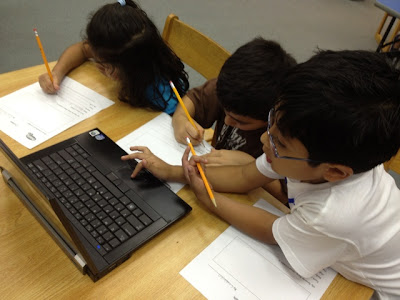Students in
Ms. Lopez's 2nd grade class have been learning about a research process that will help them with information needs this year. It is called the
Super 3 and it has 3 steps: Plan, Do, Review! Ms. Lopez and I introduced this process to the students on Monday. We learned that each step has a purpose to help us complete research.
1. Plan
What am I supposed to do?
What do I need to get the job done?
What do I want it to look like when I'm done?
2. Do
I must locate the things I will need (books, websites, materials etc.).
I need to ask questions, read, and take notes.
I need to use the information I find to create something.
3. Review
Did I do what I was supposed to do (checklist)?
Am I proud of what I've done?
What was hard for me during this process? What did I learn?
Our Project: We used the
Super 3 steps to help us create a
Weather Dictionary. Check out the pictures below to see each step of the process!
Step 1: Plan!
We worked with our partner to plan out what we needed to do to find, record, and review our information. Books, computers, magazines, and real experts were all suggested resources for us to use!
Step 2: Do!
I showed the students how to use a great non-fiction website called
PebbleGo. PebbleGo had all the articles we needed to learn about our weather words. We could listen to the information and read along at the same time. There were also video clips and pictures to help us understand more about our weather word. We learned how to take notes using phrases and then we put our phrases together to write a definition in our own words.
Step 3: Review!
In the last step of our process we used a checklist to review our work. We had to make sure we followed all the directions and submitted our very best efforts. After our definition was complete, we reflected on the Super 3 and how it helped us think about the steps of a research process. The Super 3 guided us to a fantastic final product--our Weather Dictionary!




































